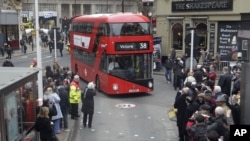LONDON —
As Christmas approaches, shoppers are hitting the streets in big numbers. In Europe, London's Oxford Street is one of the most famous destinations, attracting visitors from around the world.
The Christmas lights are up on Oxford Street, the shoppers are out in force and retailers are eyeing big takings. Buses too are a constant presence - almost 300 an hour. The mix can be deadly, making it one of the most dangerous streets in London, say organizers who are fighting to get the famous red double-deckers banned.
Three years ago, businessman Tom Kearney was walking back to his office by way of Oxford Street when he was hit by a bus.
"I was standing on the curb right there, waiting to cross the street, when a bus going 16- or 20 miles-an-hour hit the back of my head, it popped both my lungs and threw me about 20 feet into the air, sending me straight into a deep coma," Kearney said. He blames the bus driver, but a police investigation did not result in any charges.
Government figures show accident rates involving buses on Oxford Street are 35 times the average of other London streets. More than 200 people have been killed or seriously injured since the year 2000.
Tom Kearney has made a full recovery and is now a vocal campaigner for improved safety on this famous street. "If you look at what Mayor [Michael] Bloomberg has done in New York City with Broadway and Times Square," Kearney explained. "If you look at what other cities have done across Europe [in] Vienna, Istanbul. They have pedestrianized major thoroughfares to allow people to walk and shop in peace and without danger."
The Greater London Authority will have the final say on banning buses or pedestrianizing Oxford Street. Stephen Knight is an elected London Assembly member, who echoes Tom Kearney's demands. "What Oxford Street desperately needs is a pedestrianized environment so that people can enjoy shopping in one of Europe's premier shopping districts," Knight said. "Not just for road safety reasons, although that's obviously very critical, but there are huge air quality issues."
Transport for London is the agency that oversees all public transport across the capital. Leon Daniels, managing director of surface transport, is against the campaign.
"It's not viable to stop the buses at either end," he said. "It really is difficult to divert them into the surrounding streets, so we want them there in the center of Oxford Street, which is where the passengers want them."
Tourists visiting Oxford Street have mixed views on the issue. One man from Italy says he is surprised to see so many people together with so many buses. But on the other hand, he said it is not stressful or chaotic, and the traffic is flowing freely.
The New West End Company, which represents retailers on Oxford Street, said its members want the road pedestrianized. And Kearney said he will not stop fighting to get one of London's most iconic symbols banned from one of its most famous streets.
The Christmas lights are up on Oxford Street, the shoppers are out in force and retailers are eyeing big takings. Buses too are a constant presence - almost 300 an hour. The mix can be deadly, making it one of the most dangerous streets in London, say organizers who are fighting to get the famous red double-deckers banned.
Three years ago, businessman Tom Kearney was walking back to his office by way of Oxford Street when he was hit by a bus.
"I was standing on the curb right there, waiting to cross the street, when a bus going 16- or 20 miles-an-hour hit the back of my head, it popped both my lungs and threw me about 20 feet into the air, sending me straight into a deep coma," Kearney said. He blames the bus driver, but a police investigation did not result in any charges.
Government figures show accident rates involving buses on Oxford Street are 35 times the average of other London streets. More than 200 people have been killed or seriously injured since the year 2000.
Tom Kearney has made a full recovery and is now a vocal campaigner for improved safety on this famous street. "If you look at what Mayor [Michael] Bloomberg has done in New York City with Broadway and Times Square," Kearney explained. "If you look at what other cities have done across Europe [in] Vienna, Istanbul. They have pedestrianized major thoroughfares to allow people to walk and shop in peace and without danger."
The Greater London Authority will have the final say on banning buses or pedestrianizing Oxford Street. Stephen Knight is an elected London Assembly member, who echoes Tom Kearney's demands. "What Oxford Street desperately needs is a pedestrianized environment so that people can enjoy shopping in one of Europe's premier shopping districts," Knight said. "Not just for road safety reasons, although that's obviously very critical, but there are huge air quality issues."
Transport for London is the agency that oversees all public transport across the capital. Leon Daniels, managing director of surface transport, is against the campaign.
"It's not viable to stop the buses at either end," he said. "It really is difficult to divert them into the surrounding streets, so we want them there in the center of Oxford Street, which is where the passengers want them."
Tourists visiting Oxford Street have mixed views on the issue. One man from Italy says he is surprised to see so many people together with so many buses. But on the other hand, he said it is not stressful or chaotic, and the traffic is flowing freely.
The New West End Company, which represents retailers on Oxford Street, said its members want the road pedestrianized. And Kearney said he will not stop fighting to get one of London's most iconic symbols banned from one of its most famous streets.




